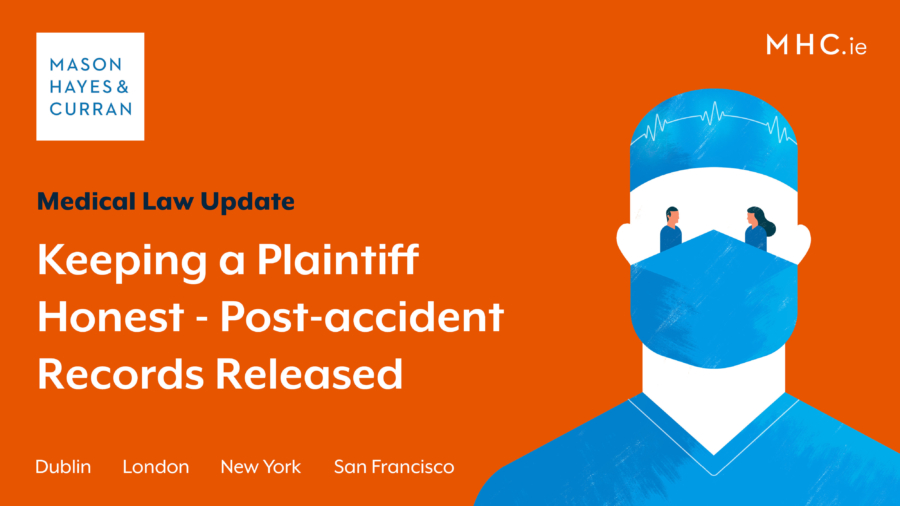
Should a plaintiff in a personal injuries case be entitled to deny a defendant sight of his post-accident medical records? This was the question posed by Judge Twomey in Egan v Castlerea Co-Operative Livestock Mart LTD[1].
Background
The plaintiff’s claim arose from injuries to his left shin and ongoing lower back pain due to an accident with a bullock at a mart in 2017. The plaintiff had a pre-existing history of back pain, having undergone spinal surgery in the 1980s. He had also previously been involved in a road traffic accident in 1999.
The plaintiff was willing to disclose his pre-accident medical records, however he refused to disclose his post-accident medical records other than details of ‘initial medical attendances’. The defendant argued that it required access to the post-accident medical records in order to determine which of the plaintiff’s complaints were attributable to the accident at the centre of the case and which were not.
Relevancy and necessity of post-accident medical records
The court noted that a key factor in determining whether the post-accident medical records are discoverable is whether they are relevant and necessary to the claim. The court held that “post-accident medical records are not only relevant but invariably crucial to every personal injuries claim”. Judge Twomey noted that in this case, the post-accident records are particularly relevant to enable the defendant to consider how many of the plaintiff’s complaints are due to the accident and how many are due to other matters.
While the plaintiff did not contend that discovery of his post-accident records was not relevant, he did however claim that it was not necessary on the basis that:
- The defendant would have sight of the plaintiff’s medical reports,
- The plaintiff’s medical expert would be cross examined on the content of their report, and
- The defendant is entitled to have the plaintiff assessed by their own medical expert.
‘Keeping parties honest’ in litigation
The court did not accept that discovery of post-accident records was unnecessary. Judge Twomey noted that the plaintiff remains in control of the medical expert they choose to support their claim for damages and also of the records and the history which is provided to that expert. In the circumstances, a plaintiff can attend several medical experts until they receive a report that supports their case, which may portray a ‘less than full picture’ of the claim. The court noted that discovery, on the other hand, plays a role in keeping parties honest.[2] The court was also not convinced that the potential for cross-examination of plaintiff experts was a good reason to deny post-accident discovery given that 97% of personal injuries cases settle before the opportunity to cross-examine arises.
Decision
The court ultimately ordered discovery of the plaintiff’s post-accident medical records. It noted that a three year period would usually apply for pre-accident discovery and this same limit should logically apply for post-accident records. However, the defendant only requested five months’ post-accident records and the court had ‘no hesitation’ in ordering discovery for this period of time.
Conclusion
While this decision appears to signal a change in attitude to the release of post-accident medical records, it is now being appealed by the plaintiff and we await the Court of Appeal decision with interest. In the meantime, this decision can be used by defendants in personal injuries cases, including those related to medical negligence claims, to support applications for discovery of post-accident records.
For more information, please contact a member of our Medical Law team.
[1] [2023] IEHC 16
[2] Tobin v Minister for Defence, 2020







